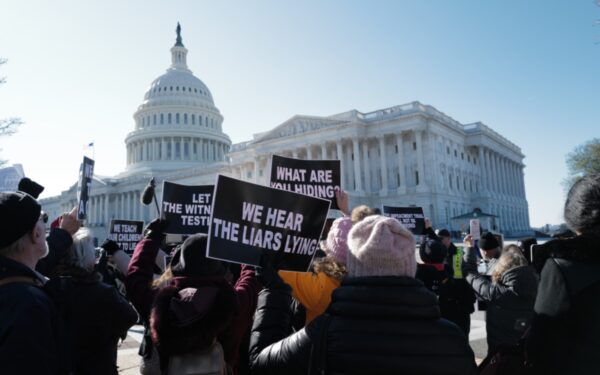It’s barely a couple of weeks since the groupthink of US news media was that the Republican Party had become “The Party of Trump”. In the talking shop of cable news, the staid pundits sat upright in their chairs and calmly described a generational shift in American politics. The old party had capitulated to the fringe. Republicanism would never be the same again. Yet as generational shifts go, this was perhaps the shortest. Today it looks like Republicans might become a party ready to run away from Trump or, at least, based on last night’s results, should be preparing to make a fast getaway.
The notion of the GOP buying into Trumpism seemed mildly risible at the time; blind to the reality of human psychology as well as the reality of politics. Very few things in politics are immutable, at least in the long term, and Republican loyalty to Trump would always have the longevity of a fruit fly once it became in their best interests to flip back to their traditionally moderate stance. That was always likely to occur after a big defeat, which is why next year mid-term elections had become the blockbuster event awaited by political watchers. The surprise was that the big defeat would come this early. Last night’s results, from coast to coast, were a stark condemnation of the sitting president, coming barely a year after he won the national election. More pointedly to a New Yorker like Trump would be the re-election of Bill de Blasio; making him the first Democrat since Ed Koch to serve successive terms as New York mayor.
Beneath the headlines — the resounding victory of Ralph Northam over Ed Gillespie, which, at nine points, was far bigger than any poll had anticipated — was a more startling result in Virginia’s House of Delegates, where Democrats might have won back control, taking 48 seats to the Republican’s 47, a gain of 14 seats with 5 still too close to call. Democrats also managed to win the elections for Lieutenant Governor and Attorney General.
Viewed objectively, this might appear unsurprising. In recent years, Virginia has become a moderately Democratic state, now generally thought of as blue rather than purple (a swing state). Virginia went for Hillary Clinton in 2016 and its current senators are both Democrats — Tim Kaine and Mark Warner. Just to balance that: seven out of its eleven Congressional Representatives are Republican. It might not be a state where Trump would expect to do well but, at the same time, it’s not a state where Republicans would expect to haemorrhage votes. In fact, recent polls suggested that the gap between the gubernatorial candidates was closing, with Gillespie looking to cause an upset.
In the end, the upset went the other way. It’s why this morning’s tweet from Trump can be viewed as nothing more than the President putting a mile between himself and Gillespie. Explaining that “Ed Gillespie worked hard but did not embrace me or what I stand for”, Trump is wilfully overlooking that Gillespie did in fact embrace Trumpism. Although he apparently rejected Steve Bannon’s offer to campaign on his behalf, Gillespie whistled loudly towards the President’s base with an inflammatory campaign that tried to make a big issue of confederate monuments and violence caused by immigrates.
What makes the result look particularly ominous for Republicans in that breakdowns of voting attitudes suggest that opposition to Trump figured largely in the election. In other words, last night’s landslide cannot be explained by individual candidates unable to replicate the Trump “magic”. Polls of the President’s approval have been historically bad for the majority of Trump’s time in office and that discontent looks to be feeding straight into convincing victories for Democrats.
If that were not worrying enough for Republicans, their problems are compounded by the fact that Democrats won despite the infighting of the past week. It’s hard to believe that revelations made by Donna Brazile, the previous DNC chairperson, would have made much impact but it speaks to the broader Republican dilemma. When a Democratic Party, unable to present a united front or express a coherent plan for future electoral success, achieves this level of victory, what kind of defeats lie ahead for the GOP? Do they follow Gillespie, mimicking Trump’s right-wing rhetoric into next year’s mid terms, or do they put some distance between themselves and the most unpopular president in American history? The reality, for many of them, is that they must now decide: do they want to lose moderately or face an electoral wipe out?



